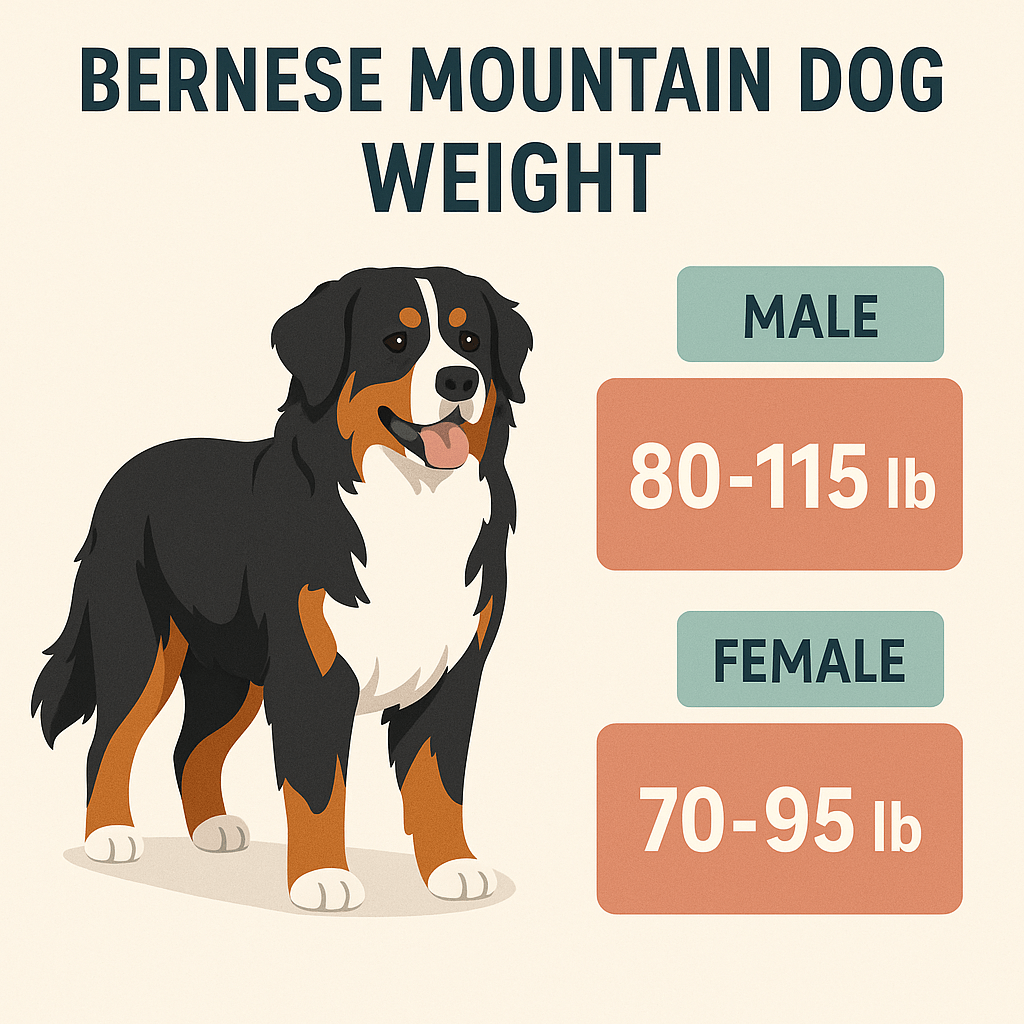Bernese Mountain Dog Weight: Understanding the Ideal Range
The Bernese Mountain Dog, with its striking tri-colored coat and gentle demeanor, is a beloved breed known for its strength, loyalty, and versatility. However, one of the most important aspects of caring for this majestic dog is understanding their weight. Maintaining an appropriate weight is crucial for their overall health, mobility, and longevity. Factors such as age, gender, diet, and activity level all play a role in determining the ideal weight for your Bernese Mountain Dog. In this blog post, we’ll explore everything you need to know about Bernese Mountain Dog weight, from breed standards to practical tips for keeping your furry friend healthy and happy.
Expert Opinion on Bernese Mountain Dog Weight
“Bernese Mountain Dogs typically weigh between 70 to 115 pounds with an average weight of 95 pounds. The weight of a Bernese Mountain Dog can vary depending on factors such as genetics, diet, exercise, and overall health.”
Ideal Weight Range for Bernese Mountain Dogs
Knowing the ideal weight range for your Bernese Mountain Dog is essential for ensuring they stay fit and healthy throughout their life. This breed is large and sturdy, but excessive weight can lead to serious health issues. Here’s what you need to know about their weight expectations.
Male Bernese Mountain Dogs:
Adult males typically weigh between 80 and 115 pounds (36 to 52 kg). Their larger frame supports their robust build and strength.Female Bernese Mountain Dogs:
Adult females usually weigh slightly less, ranging from 70 to 95 pounds (32 to 43 kg), reflecting their slightly smaller stature.Puppy Growth Stages:
Bernese Mountain Dog puppies grow rapidly during their first year, reaching about half their adult weight by six months.Breed Standards and Variations:
While these ranges are typical, individual dogs may vary slightly depending on genetics and lifestyle factors. Always consult your veterinarian for personalized advice.Signs of Healthy Weight:
A healthy Bernese Mountain Dog should have a visible waistline, ribs that can be felt but not seen, and smooth movement without signs of strain.
Understanding these weight guidelines helps you monitor your dog’s health and take action if they fall outside the ideal range.

Factors That Influence Bernese Mountain Dog Weight
Several factors contribute to a Bernese Mountain Dog’s weight, and being aware of them can help you manage their health effectively. From genetics to daily habits, here’s what impacts their size and weight.
Genetics and Lineage:
A dog’s genetic makeup plays a significant role in determining their size and weight potential. Parents’ weights often influence their offspring.Age and Life Stage:
Puppies, adults, and senior dogs have different nutritional needs, which can affect their weight as they transition through life stages.Diet and Nutrition:
High-quality food tailored to large breeds ensures proper growth and weight management. Overfeeding or poor nutrition can lead to obesity.Activity Level:
Bernese Mountain Dogs require regular exercise to maintain a healthy weight. Lack of activity can result in weight gain and related health problems.Health Conditions:
Certain medical conditions, such as hypothyroidism or joint issues, can impact weight by affecting metabolism or mobility.
By addressing these factors proactively, you can help your Bernese Mountain Dog achieve and maintain a healthy weight.
Check this guide 👉Bernese Mountain Dog Poodle Mix: Best 7 Expert Tips!
Check this guide 👉Golden Mountain Bernese Dog Price: Best 7 Expert Tips!
Check this guide 👉Greater Swiss Mountain Dog vs Bernese Mountain Dog: Best 7 Tips!
Healthy Weight Tips for Bernese Mountain Dogs | Common Weight-Related Health Issues |
|---|---|
Provide portion-controlled meals | Hip dysplasia due to excess weight |
Incorporate daily exercise | Joint pain and arthritis |
Avoid overfeeding treats | Obesity-related heart strain |
Schedule regular vet check-ups | Reduced mobility and energy levels |
Use breed-specific high-quality dog food | Digestive issues from improper diet |
How to Monitor Your Bernese Mountain Dog’s Weight
Regularly monitoring your Bernese Mountain Dog’s weight is key to catching any issues early and ensuring they stay within a healthy range. Here are some steps to keep track of their weight effectively.
Weigh Them Regularly:
Use a pet scale or visit your vet periodically to measure your dog’s weight accurately.Perform a Body Condition Check:
Run your hands along their sides and back to feel for ribs and a defined waistline. Adjust feeding or exercise accordingly.Track Growth Progress:
For puppies, record their weight monthly to ensure they’re growing at a steady pace without becoming overweight.Watch for Behavioral Changes:
Lethargy, difficulty moving, or excessive panting can indicate weight-related health concerns.Consult Your Veterinarian:
If you notice sudden weight gain or loss, seek professional advice to rule out underlying health problems.
Consistent monitoring allows you to address weight issues promptly and keep your Bernese Mountain Dog in top condition.
Tips for Managing Your Bernese Mountain Dog’s Weight
Helping your Bernese Mountain Dog maintain a healthy weight requires a combination of proper nutrition, exercise, and routine care. These tips will guide you in creating a balanced lifestyle for your furry companion.
Choose High-Quality Food:
Opt for dog food formulated for large breeds, rich in protein and essential nutrients, to support muscle development and overall health.Limit Treats and Snacks:
Keep treats to a minimum and use low-calorie options to prevent unnecessary calorie intake.Incorporate Daily Walks:
Aim for at least 30 minutes to an hour of exercise daily, including walks, playtime, or agility training.Adjust Portions Based on Age:
Senior dogs may require fewer calories than active adults, so tailor portion sizes to their specific needs.Provide Mental Stimulation:
Puzzle toys and interactive games keep your dog mentally engaged while encouraging physical activity.
By following these tips, you can create a sustainable routine that promotes a healthy weight and enhances your dog’s quality of life.
Common Mistakes to Avoid
When managing your Bernese Mountain Dog’s weight, it’s easy to make mistakes that could negatively impact their health. Being aware of these pitfalls can help you avoid them and keep your dog in peak condition.
Overfeeding Puppy Food:
Puppies grow quickly, but overfeeding can lead to excessive weight gain and joint stress. Transition to adult food at the right time.Ignoring Portion Sizes:
Free-feeding or guessing portion sizes can result in overeating. Follow feeding guidelines based on your dog’s age and weight.Skipping Vet Visits:
Regular check-ups are essential for monitoring weight and addressing potential health concerns early.Neglecting Exercise Needs:
Even calm Bernese Mountain Dogs require daily activity to stay fit and prevent obesity.Using Human Food as Treats:
Many human foods are unhealthy or toxic for dogs, leading to weight gain or digestive issues. Stick to dog-safe snacks.
Avoiding these mistakes ensures your Bernese Mountain Dog stays healthy and active throughout their life.
Signs of Weight-Related Health Problems
Excessive weight can lead to a variety of health issues in Bernese Mountain Dogs. Recognizing the signs early allows you to take corrective action and improve their well-being.
Difficulty Moving or Rising:
Struggling to stand up or climb stairs may indicate joint pain caused by excess weight.Labored Breathing:
Overweight dogs often experience breathing difficulties, especially during exercise.Lethargy and Low Energy:
A sudden drop in activity levels can signal discomfort or fatigue due to carrying extra pounds.Skin Irritation or Rashes:
Excess fat can cause skin folds, leading to irritation or infections.Increased Appetite Despite Weight Gain:
Hormonal imbalances or metabolic issues may cause weight gain even with normal eating habits.
Addressing these symptoms promptly can prevent further complications and improve your dog’s quality of life.
Fun Ways to Keep Your Bernese Mountain Dog Active
Exercise doesn’t have to be boring! Engaging your Bernese Mountain Dog in fun activities not only helps manage their weight but also strengthens your bond.
Play Fetch:
Use a durable ball or frisbee to encourage running and retrieving in a safe, open space.Go Hiking Together:
Bernese Mountain Dogs love exploring trails and enjoying the outdoors with their owners.Try Agility Training:
Set up simple obstacle courses to challenge their mind and body while burning calories.Swimming Sessions:
Low-impact swimming is excellent for building muscle and endurance without stressing joints.Interactive Toys:
Puzzle feeders and treat-dispensing toys keep them entertained while encouraging movement.
Incorporating these activities into your routine makes exercise enjoyable for both you and your Bernese Mountain Dog.
Frequently Asked Questions About Bernese Mountain Dog Weight
What is a healthy weight for a full-grown Bernese Mountain Dog?
Male Bernese Mountain Dogs typically weigh 80–115 pounds, while females weigh 70–95 pounds.
How can I tell if my Bernese Mountain Dog is overweight?
Look for a lack of a visible waistline, difficulty feeling their ribs, or reduced energy levels.
How much should I feed my Bernese Mountain Dog daily?
Feeding amounts depend on age, size, and activity level, but most adults require 3–4 cups of high-quality food per day, split into two meals.
Can Bernese Mountain Dogs lose weight quickly?
Rapid weight loss can harm their health; aim for gradual, controlled weight reduction under veterinary guidance.
Why is my Bernese Mountain Dog losing weight unexpectedly?
Sudden weight loss could indicate dental issues, parasites, or other health problems—consult your vet immediately.
Prioritizing Your Bernese Mountain Dog’s Health Through Proper Weight Management
Maintaining a healthy weight is one of the most important aspects of caring for your Bernese Mountain Dog. By understanding their ideal weight range, monitoring their condition, and implementing a balanced diet and exercise routine, you can ensure they live a long, happy, and active life. Remember, every dog is unique, so tailor your approach to their individual needs and consult your veterinarian whenever necessary. With love, attention, and proactive care, you’ll give your Bernese Mountain Dog the best chance to thrive and enjoy their time by your side.
Newfoundland Dog Personality: Best 7 Expert Tips! – Discover the gentle, loyal, and protective nature of this giant breed perfect for families.
Can Hot Pavement Burn Your Cats Paws? Best 7 Expert Tips! – Learn how to protect your cat’s paws from hot surfaces and prevent painful burns this summer.
Can Hot Pavement Burn Your Dogs Paws? Best 7 Expert Tips! – Learn how to protect your dog’s paws from hot surfaces and ensure safe summer walks.
Irish Wolfhound Size: Best 7 Expert Tips! – Discover the ideal height, weight, and care tips for this majestic giant breed. Learn how to manage their impressive stature responsibly.




